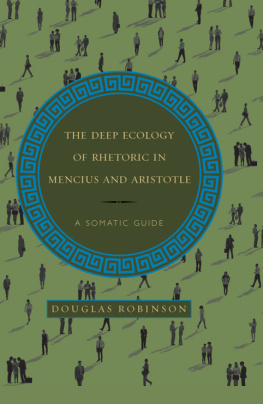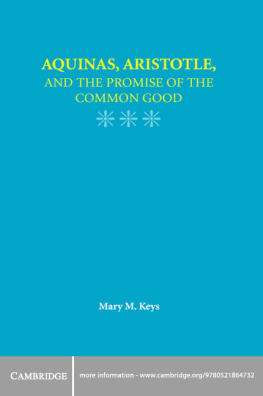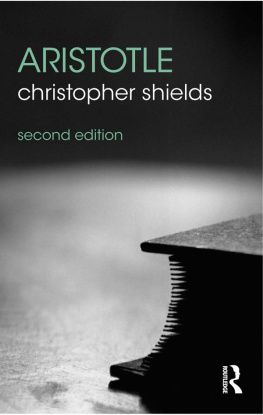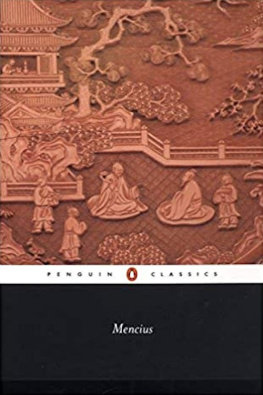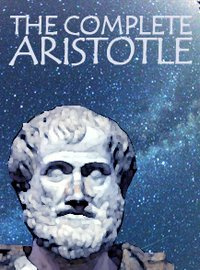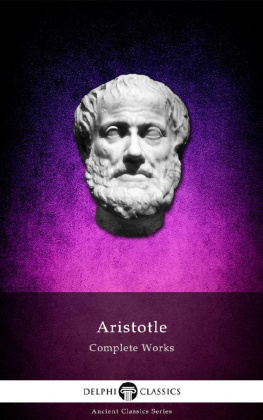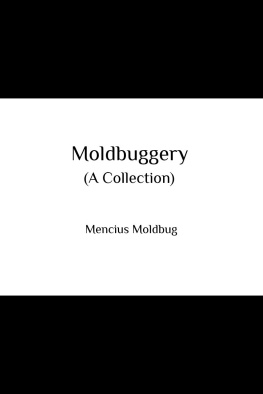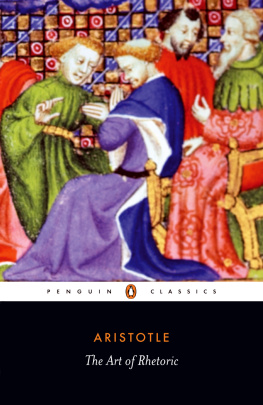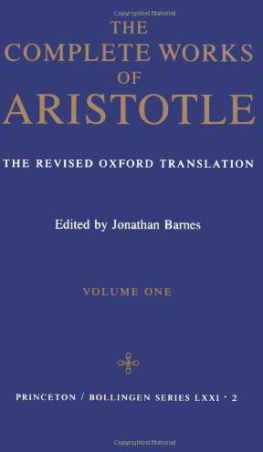THE DEEP ECOLOGY
OF RHETORIC IN
MENCIUS AND ARISTOTLE
SUNY series in Chinese Philosophy and Culture
Roger T. Ames, editor
THE DEEP ECOLOGY OF RHETORIC IN MENCIUS AND ARISTOTLE
A SOMATIC GUIDE
DOUGLAS ROBINSON
Published by State University of New York Press, Albany
2016 State University of New York
All rights reserved
Printed in the United States of America
No part of this book may be used or reproduced in any manner whatsoever without written permission. No part of this book may be stored in a retrieval system or transmitted in any form or by any means including electronic, electrostatic, magnetic tape, mechanical, photocopying, recording, or otherwise without the prior permission in writing of the publisher.
For information, contact State University of New York Press, Albany, NY
www.sunypress.edu
Production, Ryan Morris
Marketing, Fran Keneston
Library of Congress Cataloging-in-Publication Data
Names: Robinson, Douglas, 1954 author.
Title: The deep ecology of rhetoric in Mencius and Aristotle : a somatic guide / Douglas Robinson.
Description: Albany : State University of New York Press, 2016. | Series: SUNY series in Chinese philosophy and culture | Includes bibliographical references and index.
Identifiers: LCCN 2015027115 | ISBN 9781438461076 (hardcover : alk. paper) | ISBN 9781438461083 (e-book)
Subjects: LCSH: MenciusCriticism and interpretation. | Rhetoric, Ancient. | AristotleCriticism and interpretation. | Persuasion (Rhetoric)HistoryTo 1500.
Classification: LCC B128.M324 R63 2016 | DDC 181/.112dc23
LC record available at http://lccn.loc.gov/2015027115
10 9 8 7 6 5 4 3 2 1
Contents
Preface
Scope of the Study
This book explores a confluence of five different fields of study, namely rhetoric, deep ecology, somatic theory, Aristotle and ancient Greek philosophy, and Mencius and early Confucianism:
rhetoric (1.1) is traditionally the study of persuasion, and specifically of the structures and forms of persuasive discourse; the deep ecology of rhetoric suggests a broader and more holistic understanding of persuasion, or persuasivity ( to pithanon ), as part of the circulation through groups of evaluative affect-becoming-conation (see the )
deep ecology (1.1): as founded by the Norwegian philosopher Arne Naess, deep ecology is the study of the Self-realization of the ecological self, a concept derived from a number of sources, including Zen Buddhism, Spinoza, and Gandhi; lurking behind his conception of Self-realization as realizing inherent potentialities, however, is Aristotles notion of the entelekheia or entelechy; q -driven moral maturation or self-realization is also Menciuss focal concern
somatics (1.2): somatic theory studies the circulation of evaluative affect through groups as the primary channel of social regulation; to the extent that the deep ecology of rhetoric is an affective social ecology, it is specifically a somatic ecology, or what I call in 4.12 a somatic exchange
Aristotle (1.23, 1.5): the Athenian philosopher (384322 BCE), considered the most important Platonist thinker after Plato himself, and in many ways more important, as he turned his master on his headin ways that are remarkably reminiscent of Mencius, his near-contemporary
Mencius (1.35): the Chinese philosopher (ca. 372ca. 303 BCE), considered the most important Confucian thinker after Confucius himself, and in many ways more important, as he expanded and complicated the basic Confucian concepts in salutary ways
The sequence in which those fields appear in the list reflects something like my expertise and argumentative priorities in this book: I admire Mencius and Aristotle, consider myself something of a follower of both, but I am very far from being an expert in either, or in classical Chinese or Attic Greek; I mostly construct the two thinkers as guides to my main concern, namely the deep somatic ecology of rhetoric. I do firmly believe that my reading of the two contemporaries is fundamentally on targetthat I am not willfully distorting their thought to suit my argumentative purposesbut I am not a trained Sinologist, Hellenist, or Sino-Hellenist. I have put in the requisite time with the bilingual dictionaries and other lexical tools designed specifically for the study of classical Chinese and Attic Greek, as well as with the last few decades of scholarship (in English) on both thinkers; my research assistant Rico Chung and various Chinese friends and colleagues have tracked down and in some cases translated important scholarly sources for me in Chinese; I have engaged the various English translations critically, even perhaps tenaciously, reading them stereoscopically against both the originals and (here and there) their classical commentators; and my Acknowledgments record my great debt to the scholars of ancient Greek, classical Chinese, and both philosophical traditions who have checked my claims about both the meanings of words and phrases in context and the philosophical positions both thinkers adopt. My readings of specific passages are on the whole tendentious, and perhaps lean more toward the radical than toward the conservative; but I would not call them idiosyncratic. My reading of Aristotle is closely aligned with the readings offered by Nancy Sherman (1989) and Jeffrey Walker (2000, 2008), for example; and my reading of Mencius is closely aligned with those offered by Roger T. Ames (1991, 2002a), Shun Kwong-loi (1997, 2002), Huang Junjie (2001), and James Behuniak Jr. (2005). I also occasionally find the temerity to disagree with these expertsbut only, it seems to me, on occasions when I think they have not pursued their own lines of interpretation consistently or insistently enough. Even so, my claims about the thought of Aristotle and Mencius are not intended, and should not be taken, as authoritative (let alone exhaustive) interpretations. They are, rather, strongly suggestive of a radically new theorization of rhetoricand, more broadly, of what I call ecosis/icosis (1.1; see the Glossary).
Im certain that readers with expertise in either Mencius, classical Chinese, and Confucian thought or Aristotle and Attic Greek will find much to pick at in my claims; and the usual acknowledgments disclaimer applies a fortiori here, that any egregious errors in my readings of the two thinkers or their wordings should be attributed to my own stubbornness rather than any gaps in the knowledge of the scholars who checked them for me. Im hoping, however, that the light those readings shed on the deep somatic ecology of rhetoric will be bright enough and novel enough that readers will be able to set any reservations they may harbor about my Mencian and Aristotelian expertise aside.
In fact my deepest expertise lies in somatic theory, especially somatic theories of translation, literature, and rhetoric and composition, on which I have published extensively for over two decades, beginning with The Translators Turn (Robinson 1991) and running more recently to Estrangement and the Somatics of Literature: Tolstoy, Shklovsky, Brecht (Robinson 2008), Translation and the Problem of Sway (Robinson 2011), First-Year Writing and the Somatic Exchange (Robinson 2012), Displacement and the Somatics of Postcolonial Culture (Robinson 2013a), Feeling Extended (Robinson 2013b), and Schleiermachers Icoses (Robinson 2013c). What I have found in Mencius and Aristotle in researching and writing this book is not only kindred somatic theorists from more than two millennia ago but deep somatic ecologists whose understanding of human social interaction everywhere complicates and occasionally derails my own.

